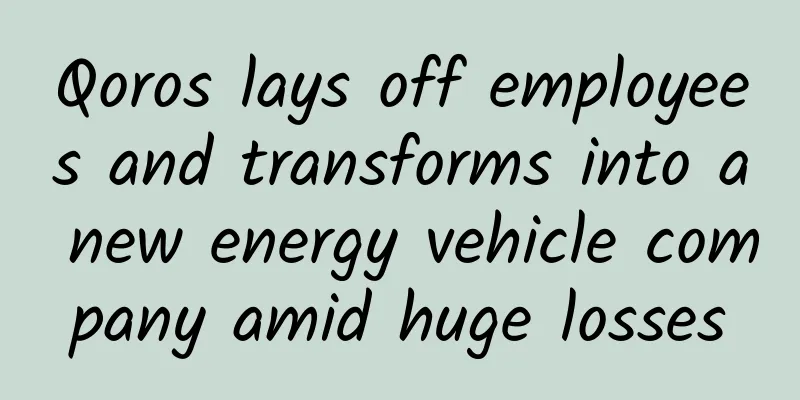Qoros lays off employees and transforms into a new energy vehicle company amid huge losses

|
This year marks the 10th anniversary of Qoros Auto, which is a milestone every ten years. Qoros is still in a state of overall loss, and the loss for the whole year of 2016 may exceed 1.8 billion yuan. Recently, according to Reuters, in order to cope with the increasingly fierce competition in the Chinese auto market, Qoros Auto has begun to streamline jobs (i.e. layoffs) to focus on the transformation into a new energy vehicle company. Nearly one-fifth of the workforce has been cut A Qoros spokesman said that in the past two years, Qoros Auto has cut nearly one-fifth of its workforce, from 2,450 employees to 1,910. According to four former Qoros employees, the layoff list includes about 80 engineering contractors and workers who recently left, most of whom are non-Chinese employees with high salaries and senior employees. These personnel changes at Qoros have not been publicly reported. In early July 2016, Qoros released its "amphibious strategy", of which "one" refers to its insistence on launching new energy products and launching a new GEV platform (global electric vehicle platform). In 2016, Qoros sold 24,188 vehicles in wholesale, a 70% year-on-year increase. However, it still failed to achieve the annual sales target of 30,000 to 60,000 units set by Qoros. Qoros is still in a state of overall loss, and the loss for the whole year of 2016 may exceed 1.8 billion yuan. Qoros Auto was founded in December 2007 as a joint venture between Chery Automobile and Kenon Holdings, an Israeli group. Today, Qoros is still a start-up car company. Now, Qoros has to face not only the pressure on car sales caused by China's economic slowdown, but also an increasingly severe competitive environment. Surrounded by powerful enemies Geely Auto and Great Wall Motor can already compete with global competitors in terms of product quality; multinational automakers have joined the competition in the low-end product market; and under policy encouragement, more and more Chinese local automobile and electric vehicle start-ups are ambitiously pouring into the new energy vehicle market. Qoros has lost 9.5 billion yuan since its founding and is in talks with Chery on how to cut costs, according to a former Qoros employee who declined to be named because he is looking for a new job. Qoros wants to use Chery's scale to find better deals in the buyer's market. Cohen said the two sides are considering launching an "additional platform" that can be quickly put into mass production. A Qoros spokesman told Reuters: "Both Qoros shareholders will continue to support the development of the brand." Cohen said Qoros must be more aggressive in pursuing pure electric and plug-in hybrid vehicles as well as autonomous driving, and "it is 100 percent certain that Qoros will eventually be a new energy vehicle company." Cohen said that Qoros will continue to update and develop traditional gasoline vehicles, and expects sales to grow by more than 50% this year, at least 37,000 vehicles, but future products will mainly be new energy vehicles. According to Gasgoo data, Qoros sold 1,217 vehicles in January 2017, down 39.4% year-on-year. The company has previously said that it hopes to reach annual sales of 150,000 vehicles by 2015 or 2016. Qoros hopes to double the number of its dealerships to 200 this year. Cohen admitted that Qoros's current dealer network is too small and its stores are often located in the wrong locations. Cohen said he hopes Qoros will be profitable in 2018. Regarding the corporate development strategy, Qoros proposed the concepts of Qoros 1.0 and Qoros 2.0. The goal of Qoros 1.0 is to quickly move Qoros from a loss-making state to a sustainable development track. Liu Liang, Qoros's chief operating officer, said that the 1.0 stage has only one indicator: "Operational cash flow must be positive!" The first step of Qoros 1.0 is to quickly increase the sales of traditional fuel vehicles. Are Qoros investors more generous? Geely Auto and Great Wall Motor can already compete with global competitors in terms of product quality; multinational automakers have joined the competition in the low-end product market; and under policy encouragement, more and more Chinese local automobile and electric vehicle start-ups are ambitiously pouring into the new energy vehicle market. For environmental protection and the development of local automobile manufacturing technology, the Chinese government encourages the manufacture and sale of pure electric and plug-in hybrid vehicles. Since 2014, China's new energy vehicle sales have increased sixfold. It is not difficult to produce electric vehicles. Automakers can easily purchase batteries and electric motors from third parties and install them on standard vehicle frames. Zhang Yu, general manager of automotive information company Automotive Foresight, said: "Because the threshold is low, everyone can do it, which increases the competitive pressure." "Qoros may have an advantage over other electric vehicle startups in terms of business survival. Most electric vehicle startups rely on venture capital, and if sales targets are not met, the project can be easily stopped." Zhang Yu added: "Qoros investors are different. Israeli investors seem to be more generous, while the local investor Chery is a state-owned enterprise." At the end of 2016, there was news that Chery Automobile and Kenon would jointly provide Qoros Auto with a shareholder loan of RMB 500 million, which would mainly be used for Qoros Auto's research and development of new energy technologies and products. Israeli businessman Idan Ofer is Kenon's main shareholder. After inheriting most of his father's business empire, he showed a great desire for adventure: investing in Better Place, a startup that develops battery swap stations (Better Place declared bankruptcy in 2013), and Pacific Drilling SA (the company's market value in the United States plummeted due to the sharp drop in crude oil prices). According to Forbes data, Ofer's net worth has shrunk by half to $3 billion since 2013. A third-party representative for Kenon declined to comment. As a winner of Toutiao's Qingyun Plan and Baijiahao's Bai+ Plan, the 2019 Baidu Digital Author of the Year, the Baijiahao's Most Popular Author in the Technology Field, the 2019 Sogou Technology and Culture Author, and the 2021 Baijiahao Quarterly Influential Creator, he has won many awards, including the 2013 Sohu Best Industry Media Person, the 2015 China New Media Entrepreneurship Competition Beijing Third Place, the 2015 Guangmang Experience Award, the 2015 China New Media Entrepreneurship Competition Finals Third Place, and the 2018 Baidu Dynamic Annual Powerful Celebrity. |
<<: Artificial intelligence may cause more than 2.4 million Japanese to lose their jobs by 2030
>>: Uxin sues Guazi for unfair competition, battle for car sources escalates
Recommend
Featured | How do major brands write Father’s Day copy?
Father's Day, as the name suggests, is a holi...
Schmidt vs. Jobs, Android vs. iOS
[[120647]] The following is excerpted from the ne...
The robots have arrived at the International Space Station. How are they doing their job?
Yesterday was the first day of 2025, and the crew...
Essential knowledge for App promotion and operation: App channel statistics!
In this article, the author will tell you: What a...
Cancer cells can be eliminated in as fast as 30 minutes! How amazing is this anti-cancer technology?
Expert in this article: Ning Bikang, Researcher, ...
Experts recommend: Complete flu vaccination before the end of October! Because...
On September 6, 2024, at the press conference on ...
Layoffs for the winter, will you be one of the 20% who are laid off at the end of the year?
[[153798]] Within 48 hours, Alibaba reduced its c...
What should you pay attention to when selecting a service provider for Hong Kong server rental?
Hong Kong servers are favored by foreign trade co...
Aion's "Pure Electric Tyrannosaurus Rex" will soon debut at the Beijing Auto Show
On April 23, the "dot projection" of th...
Tavistock short-term dynamic therapy twelve-lecture online course complete set of materials
Tavistock Short-Term Dynamic Therapy 12-Lecture O...
Network framework analysis – all tricks
Preface I took some time to read the source code ...
Come and learn! Doing these exercises more often can prevent cervical spondylosis
Author: Tang Qin, Researcher of Chinese Medical A...
BYD Han sales continue to lead the domestic mid-to-large sedan market, with monthly sales exceeding 12,000 units
Since its launch, BYD Han's sales have been r...
【Full version tutorial】Information flow advertising series, just this is enough!
Feed ads, as the name suggests, are a form of adv...
The relationship between programmer growth and the number of lines of code
In 2011, John D. Cook wrote a blog post in which ...









